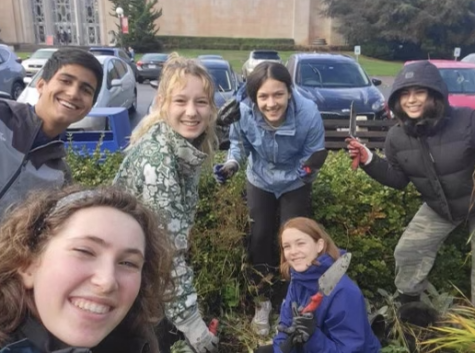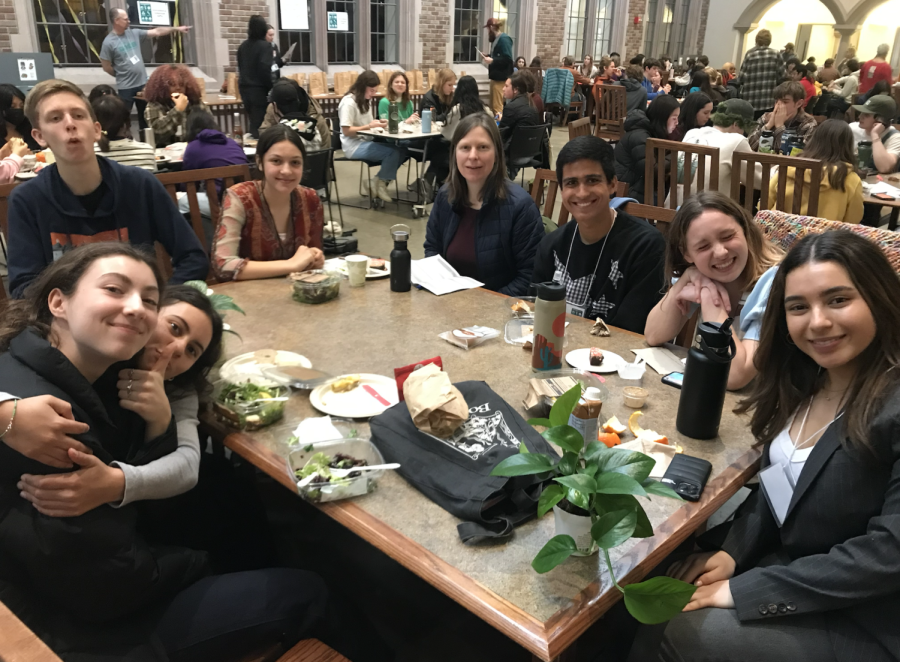Green Club: The Future of Sustainability at Lakeside
Whether they’re extolling the virtues of conscious waste-sorting or heralding the arrival of the AAC’s new compost bins, Green Club (and their prolific posters) have undoubtedly caught the attention of any Lakesider walking through campus this past year. However, the actual specifics of the club remain a mystery to most: Where did they come from? What are they planning? And how, in such a short time, have they managed to accomplish so much? In order to shed more light on the internal workings of Green Club, I sat down with four of the club leaders: Sophia H. ’25, Nicole G. ’25, Anni Y. ’24, and Khalil W. ’24.
Green Club began during the fall of 2022, when Nicole and Sophia, inspired by childhood experiences with environmentalism, placed a notice in the Bull reaching out to students who would be interested in forming an environmental awareness club. Shortly thereafter, they were contacted by Khalil, Anni, and Demri C. ’26, who were similarly interested in sustainability and climate consciousness, and together, they formed Green Club.
During the club’s early stages, the leaders looked for ways to both improve sustainability within Lakeside and engage with Seattle’s wider community of environmentalists. Regarding the latter, Green Club members attended several climate conferences over the past year, such as the environmental leaders’ summit hosted by the YMCA Earth Service Corps and the Youth Environmental Symposium at the University of Washington, where they discussed everything from climate movements at nearby schools to government policies on environmental activism.
“It was a really cool experience for the club,” noted Khalil, adding that they were able to “table with some different organizations that we may want to get involved with” in the future.

Within Lakeside itself, club leaders began to facilitate discussions with adults and administrators in the community with the goal of developing a better understanding of the campus and the way it worked. One of the club’s central initiatives began to take shape when the leaders noticed that the WCC was the only building on Lakeside’s campus that had compost bins. Because the majority of students were eating lunch outside of the WCC, their compostable takeaway plates and utensils were often thrown in the trash, creating unnecessary waste and cementing unsustainable habits. In response, Green Club sought to place compost bins all over campus in order to promote responsible sorting practices.
To start, the group focused on the AAC, a spot students regularly frequent during lunch. The club’s first steps were meeting with Director of Facilities Dan Dawkins as well as Director of Athletics Chris Hartley. Following their discussion, Mr. Dawkins agreed to allow the introduction of compost bins into the AAC provided that the maintenance of the bins didn’t place any extra responsibilities on Lakeside’s janitorial team.
Thus, Green Club members took up the responsibility of monitoring, collecting weight data on, and taking out the compost bins during the two-week trial. Following the end of the trial period, the leaders presented an updated proposal to Mr. Dawkins, who helped them permanently implement three bins in the AAC. Recently, they have extended the composting system to St. Nick’s as well.
The frequency of sorting errors in these new locations became a major issue, with non-compostable items getting mixed up in the compost bins, and compostable items still being thrown in the trash. Nevertheless, Green Club has consistently tried to promote sustainable sorting habits within the student body through posters, emails, and changes to the configurations of the bins.
“We’re still trying to figure out what our role can be with [sorting errors],” said Anni, explaining that “if it’s a campus-wide lack of understanding, that’s something that we can try to solve, but there is a point where it’s hard for us to monitor every single person.”
Though the club leaders recognize that students are always busy, and that composting is likely the last thing on their minds, increasing awareness around sorting remains a central goal for the club. Presently, leaders are working to find methods of outreach that accurately stress the importance of sorting without coming across as overbearing. “There’s a tendency to overlook the impact of one piece of trash,” noted Sophia. “It’s just one piece, after all. But collectively, it does make an impact if we all neglect to properly sort our trash.”
Following their breakthroughs with the compost system, the club has begun to work towards installing a greenhouse on campus next. Currently, they are drafting a proposal detailing the construction of a greenhouse on the land near the Head’s House. Through this initiative, Green Club hopes to promote sustainability and environmental science at Lakeside and are working with members of the science department to potentially integrate aspects of the greenhouse into the science curriculum as well.
Looking towards the future, Green Club has big things planned. In the short term, Lakesiders can look forward to the greenhouse, collaboration between students and alumni on environmental projects, and special Earth Day activities. As for the long-term, Green Club aims to build an enduring legacy of sustainable practices and environmental awareness at Lakeside, one which connects people in a unified, grade-spanning effort. To that effect, Nicole stated, “We hope that environmentalism can be a welcoming community at Lakeside,” expressing hope for the continued success of the club long after their graduations.
Since COVID, Amber has branched into a journalism as a passion, with inflammatory articles like replacing the Quad with a parking lot to "eliminate the...

